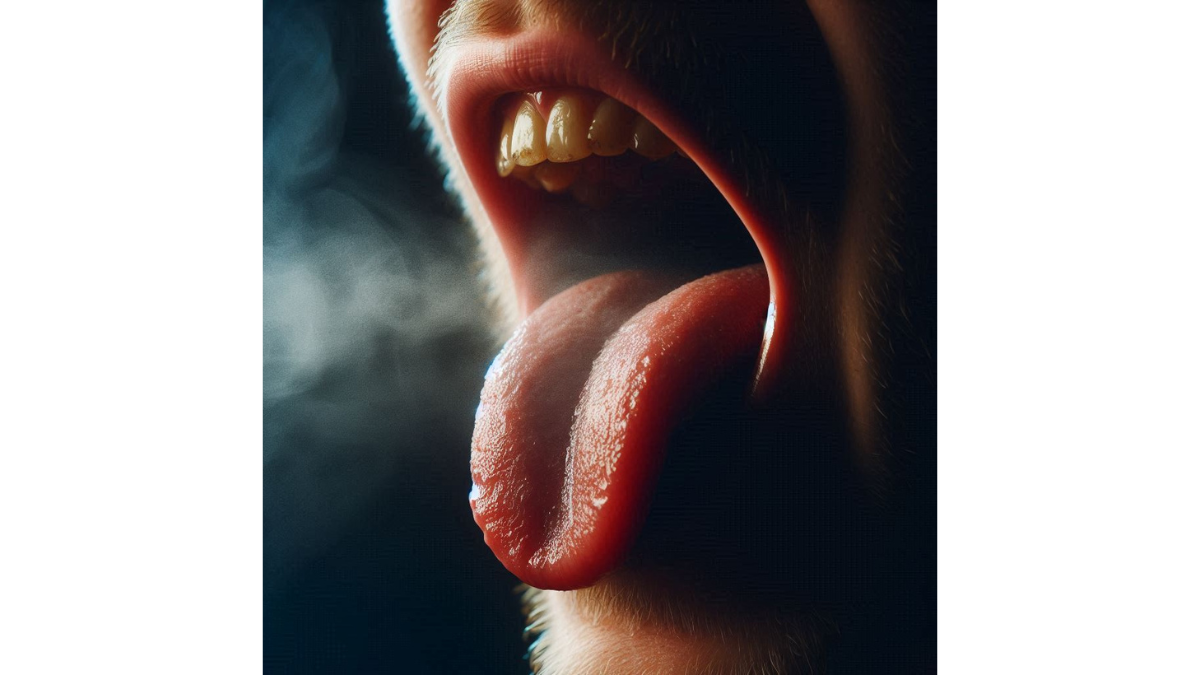What causes bad smell from the mouth

What causes bad smell from the mouth – Halitosis, commonly known as bad breath, is the unpleasant odor that emanates from one’s mouth. It can happen to anyone, regardless of age or lifestyle. It’s usually due to the accumulation of bacteria in the oral cavity, which leads to the breakdown of food particles and the release of sulfur compounds. You might have experienced a moment when you caught a whiff of your breath after a long day without brushing – it’s an all-too-common occurrence that can be quite uncomfortable, both for you and those around you. Interestingly, bad breath is not just a simple hygiene issue. Various factors contribute to its occurrence, ranging from poor oral care habits to specific health conditions. By understanding what causes halitosis, you’ll be better equipped to manage or prevent it.
Importance of Addressing Bad Breath
Ignoring bad breath can be detrimental, affecting your self-esteem and social interactions. Have you ever hesitated to lean in for a conversation, fearing that your breath might be less than pleasant? Similarly, studies show that about 50% of adults report experiencing halitosis at some point. Here’s why addressing it is crucial:
- Social Impact: Bad breath can lead to discomfort in close conversations, potentially straining relationships.
- Health Indicator: Persistent bad breath might signal underlying health issues, such as dental problems or systemic conditions.
- Confidence: Fresh breath is linked to feeling confident and engaging comfortably in social settings.
Ultimately, by recognizing and tackling halitosis early on, you empower yourself to enjoy life to the fullest, both socially and confidently.
Common Causes of Bad Breath
Poor Oral Hygiene
One of the most common causes of halitosis is poor oral hygiene. It sets the stage for bacteria to thrive in your mouth, contributing significantly to bad breath. Consider this: if you don’t brush and floss regularly, food particles remain trapped between your teeth and on your tongue, creating a veritable feast for bacteria.
- Brushing Twice a Day: Not just once! Make it a habit to brush your teeth at least twice daily for effective plaque removal.
- Flossing: Flossing helps reach the areas where even the best toothbrushes can’t. Aim for daily flossing to keep those spaces clean.
- Tongue Cleaning: Your tongue can harbor bacteria, which leads to bad breath. Use a tongue scraper or your toothbrush to clean it regularly.
Consuming Certain Foods and Drinks
The foods and drinks you consume can also play a significant role in the freshness of your breath. For example, garlic and onions are notorious for leaving a lingering odor. As your body metabolizes these foods, they release compounds that travel through your bloodstream to your lungs, making their presence known when you exhale. Other culprits include:
- Coffee: While it might jumpstart your day, coffee can be quite odorous.
- Alcohol: It leads to dry mouth, another factor that contributes to bad breath.
So, the next time you enjoy that garlic-laden pasta or sip on coffee, keep in mind that deliciousness may come at the cost of fresh breath. It’s all about balancing your diet with oral hygiene practices to keep halitosis at bay!
Health Conditions Linked to Bad Breath
Dental Issues
Bad breath can often be a red flag indicating underlying dental issues. Conditions such as tooth decay, gum disease, or abscesses can cause persistent halitosis. Picture this: if you’ve ever had a cavity, you might have noticed an unpleasant odor when the tooth is compromised. It’s your body signaling that something isn’t right. Common dental issues related to bad breath include:
- Cavities: Decayed teeth provide a breeding ground for bacteria, leading to foul odors.
- Gum Disease: Conditions like gingivitis or periodontitis are characterized by gum inflammation and can result in significant bad breath.
- Oral Infections: Abscessed teeth or infections in the mouth can emit a strong, unpleasant smell.
Maintaining regular dental check-ups can help catch these issues early, preventing bad breath and maintaining oral health.
Respiratory Infections
An unexpected yet common contributor to halitosis is respiratory infections. Conditions like sinus infections, colds, and bronchitis can dry out your mouth, leading to bacteria buildup and unpleasant odors. It might feel like your breath gets worse every time you catch a cold, and you’re not alone in this! Here are a few respiratory conditions that may lead to bad breath:
- Sinus Infections: Mucus build-up provides an environment for bacteria to flourish.
- Post-nasal Drip: This condition leads to mucus dripping down the back of your throat, creating a buildup of odors.
Recognizing how your health intertwines with bad breath is vital. If you find that your halitosis persists despite good oral hygiene and diet, it may be time to consult with a healthcare provider to uncover potential underlying health conditions. Taking action can lead to clearer breathing and more confident conversations!
Medications and Bad Breath
Side Effects of Medications
It’s fascinating how the very medications that help you feel better can sometimes come with a downside, such as bad breath. Many commonly prescribed drugs have the unfortunate side effect of dry mouth, also known as xerostomia. When saliva production decreases, the natural cleansing mechanism of your mouth is compromised, giving way to bad odors. Some medications notorious for causing dry mouth include:
- Antidepressants: Used to treat mood disorders, they can interfere with saliva production.
- Antihistamines: Ideal for allergy relief, these can also lead to a parched mouth.
- Pain Medications: Particularly opioids, they often have dry mouth listed as a side effect.
Think back to the last time you started a new medication. Did you notice a change in your breath?
Impact on Oral Health
The repercussions of dry mouth extend beyond bad breath; they can also affect your overall oral health. A lack of saliva not only means fewer defenses against bacteria but can also result in:
- Increased Tooth Decay: Without saliva to neutralize acids and wash away food particles, cavities can form more easily.
- Gum Disease: Bacteria thrive in dry conditions, leading to an increased risk of gingivitis and periodontitis.
If you suspect that your medication is playing a role in your bad breath, don’t hesitate to reach out to your healthcare provider. Sometimes, they may suggest alternative treatments or recommend strategies to manage dry mouth. Taking action not only helps improve your breath but also supports your overall oral health!
Lifestyle Factors Contributing to Bad Breath
Smoking and Tobacco Use
It’s no secret that smoking and tobacco use can wreak havoc on your health, and one noticeable side effect is bad breath. If you’ve ever shared a room with a smoker, you might recall the lingering odor that can permeate the air. This is not just an external concern; the inside of a smoker’s mouth can face similar consequences. Here’s how smoking affects breath:
- Dry Mouth: Tobacco products contribute to dry mouth, reducing saliva production, which is essential for washing away food particles and neutralizing acids.
- Bacterial Growth: Smoking fosters an environment where bacteria can thrive, further intensifying unpleasant odors.
- Gum Disease: Smokers have a higher risk of developing gum disease, leading to additional sources of halitosis.
If you’re a smoker, it may be time to consider reducing or quitting for both your breath and overall health!
Dietary Habits
What you eat has a direct impact on your breath, and your dietary choices can make a significant difference in how fresh it smells. Foods that are flavorful and aromatic can linger longer than a peppermint after a meal. Common dietary culprits include:
- Garlic and Onions: Delicious in many dishes, these can leave a potent aftertaste as they release sulfur compounds during digestion.
- Sugary Foods: Foods high in sugar can lead to increased bacteria growth, worsening bad breath. Think twice before reaching for that candy bar!
- Dairy Products: While nutritious, they can sometimes create milky odors, especially if not accompanied by proper oral hygiene.
To keep your breath fresh, consider balancing your meals with plenty of water, crunchy fruits, and vegetables that help clean your mouth naturally. It’s all about making mindful choices that enhance both your health and social interactions!
Dry Mouth and Halitosis
Saliva Production and Bad Breath
Now, let’s delve into one of the lesser-known culprits behind bad breath: dry mouth, also known as xerostomia. Saliva plays a crucial role in maintaining oral health—it acts as a natural cleanser, washing away food particles and neutralizing acids produced by bacteria. When you experience dry mouth, the reduction in saliva can create the perfect storm for halitosis. Imagine this: you’re in a meeting, and you suddenly notice your mouth feels parched. That lack of moisture not only makes it harder to speak but can also lead to an unpleasant odor as bacteria multiply in the dry environment. Key points about saliva’s role:
- Natural Defense: Saliva contains enzymes that help digest food and inhibit bacterial growth.
- PH Balance: It helps maintain a neutral pH in your mouth, preventing acid buildup that can lead to decay and bad breath.
- Taste Function: Saliva is essential for tasting food; without it, your meals can become bland.
Tips for Preventing Dry Mouth
Combatting dry mouth can be straightforward with a few lifestyle changes. Here are some practical tips to keep your mouth moist and your breath fresh:
- Stay Hydrated: Drink plenty of water throughout the day. Keeping a water bottle handy can help.
- Chew Sugar-Free Gum: Chewing stimulates saliva production, especially if it’s flavored with mint or cinnamon.
- Use a Humidifier: If you sleep with your mouth open or are in a dry climate, a humidifier can help add moisture to the air.
- Avoid Caffeine and Alcohol: These beverages can contribute to dehydration, exacerbating dry mouth.
By incorporating these habits into your daily routine, you can help keep that moisture flowing and minimize the risk of halitosis. Your mouth—and your conversations—will thank you!
Chronic Health Conditions and Halitosis
Diabetes and Bad Breath
Chronic health conditions can significantly impact your oral health, and one of the most notable connections is between diabetes and bad breath. If you or someone you know has diabetes, you may have experienced this phenomenon. Fluctuations in blood sugar levels can lead to diabetic ketoacidosis, a condition where your body starts breaking down fats instead of glucose. As a result, acetone is produced—a compound that not only shows up in your breath but can also give it a distinctive, fruity smell. Here are ways diabetes can influence bad breath:
- Dry Mouth: Many diabetics face xerostomia due to high blood sugar or medications, leaving them susceptible to halitosis.
- Gum Disease: Diabetes increases the risk of gum disease, further heightening bad breath due to inflammation and bacteria buildup.
Being proactive with oral hygiene and managing your diabetes can help maintain fresh breath.
Gastrointestinal Issues
Gastrointestinal problems can also contribute to halitosis. Conditions such as acid reflux, GERD (gastroesophageal reflux disease), or other digestive disorders can lead to stomach acids entering your mouth, creating an unpleasant smell. Consider these gastrointestinal issues related to bad breath:
- Acid Reflux: When stomach acid flows back into the esophagus, it can lead to a sour or bitter taste and bad odor on your breath.
- Bacterial Overgrowth: Conditions like small intestinal bacterial overgrowth (SIBO) can produce an excess of gas and unpleasant smells.
If you suspect that your gastrointestinal health is impacting your breath, don’t hesitate to consult a healthcare provider. Addressing these health conditions can make a significant difference, not just for your breath but also for your overall well-being. Taking action now leads to happier stomachs and fresher conversations!
Psychological Factors and Bad Breath
Stress and Halitosis
While we often think of bad breath as linked strictly to physical health, psychological factors like stress can play a surprising role. When you’re stressed, your body reacts in various ways, including the production of hormones that may lead to dry mouth. Picture a stressful day at work—maybe you have a presentation to give. As your stress levels rise, you might notice that your mouth becomes dryer, making fresh breath more difficult to maintain. Here are some ways stress can contribute to halitosis:
- Decreased Saliva Production: Stress can inhibit the flow of saliva, which is crucial for washing away food particles and neutralizing oral bacteria.
- Mouth Breathing: In stressful situations, you may breathe more rapidly or through your mouth, further drying out your oral cavity.
Impact of Anxiety on Oral Health
Anxiety doesn’t just impact your mood; it can also manifest physically, affecting your oral health. Those feeling anxious may also neglect their daily hygiene routines, opting out of brushing or flossing altogether. If you’ve been in a state of high anxiety, you might not have had the motivation to take care of your oral health as diligently as you should. Consider these factors:
- Increased Grinding: Anxiety can lead to bruxism, or teeth grinding, which can cause damage to your teeth and contribute to bad breath.
- Neglected Care: Heightened anxiety levels can make it easy to overlook regular dental visits or routine oral hygiene.
Therefore, addressing your mental health is just as crucial as caring for your teeth. Using stress management techniques such as mindfulness, deep breathing exercises, or seeking professional help can pave the way for improved oral and mental health. Remember, a calm mind can lead to fresh breath and open up opportunities for more confident interactions going forward!
Bad Breath in Children
Causes of Halitosis in Kids
When it comes to children, bad breath can be both perplexing and concerning for parents. While kids are known for their love of sweets and the occasional neglect of oral hygiene, there are several specific reasons why your little ones might be experiencing halitosis. Common causes of bad breath in children include:
- Poor Oral Hygiene: Kids might skip brushing or flossing, leading to food particles and bacteria buildup, which can develop into bad breath.
- Nasal Issues: Conditions like sinus infections or allergies can cause post-nasal drip, contributing to foul-smelling breath.
- Dietary Choices: Children often favor strong-smelling foods, such as garlic or onion, which can linger after meals.
- Mouth Breathing: If your child breathes through their mouth—especially while sleeping—this can dry out their mouth and lead to bad breath.
It’s important to address these issues early on to prevent any embarrassment or social discomfort for your child.
Tips for Parents
As a parent, it’s your job to help your child maintain fresh breath. Here are some practical tips:
- Establish a Routine: Encourage regular brushing and flossing at least twice a day. Make it fun by using colorful toothbrushes and kid-friendly toothpaste.
- Frequent Dental Checkups: Schedule regular visits to the dentist to ensure any underlying issues are addressed promptly.
- Healthy Snacks: Offer snacks that can help clean the mouth, like apples or carrots, rather than sugary options that contribute to bad breath.
- Hydration: Encourage your child to drink water throughout the day to keep their mouth moist and rinse away food particles.
By fostering good oral habits and maintaining an open conversation about oral health, you can help your child combat bad breath and grow into confident individuals ready to take on the world with a fresh smile!
Prevention and Treatment of Bad Breath
Oral Hygiene Practices
Preventing and treating bad breath begins at home with solid oral hygiene practices. Establishing a consistent routine can make a world of difference, not only for your breath but also for your overall oral health. It’s all about the basics! Here are some essential oral hygiene practices to follow:
- Brushing: Brush your teeth at least twice a day using fluoride toothpaste. Don’t forget to brush your tongue as well, as bacteria love to hide there!
- Flossing: Make it a habit to floss daily. This cleans between your teeth and helps remove food particles that can cause bad odors.
- Rinsing: Use an antimicrobial mouthwash to help kill bacteria and freshen your breath. Opt for alcohol-free options to avoid drying out your mouth.
- Stay Hydrated: Drink plenty of water throughout the day to help wash away food particles and keep your saliva flowing.
By incorporating these simple practices into your daily routine, you’ll be well on your way to freshening up your breath.
Professional Dental Care
While good hygiene practices are crucial, regular visits to your dentist are equally important. Your dentist can identify underlying conditions that may contribute to bad breath, ensuring that you receive the appropriate treatment.
- Regular Checkups: Aim to see your dentist at least twice a year. They can clean your teeth, check for cavities or gum disease, and provide tailored advice based on your oral health.
- Dental Cleanings: Professional cleanings help remove plaque and tartar that home brushing might miss, significantly reducing bad breath.
- Addressing Issues: If you have ongoing issues, such as cavities or gum disease, don’t put off treatment. Addressing these promptly can lead to fresher breath and improved overall health.
Combining good oral hygiene with professional care creates a strong defense against bad breath, ensuring you can confidently engage in conversations without worry!
Natural Remedies for Bad Breath
Breath-Freshening Foods and Herbs
When it comes to fighting bad breath, nature has some incredible allies. Including certain foods and herbs in your diet can not only enhance your meals but also help freshen your breath. Think of these natural remedies as your culinary defenders against halitosis! Here are some effective options:
- Parsley: This herb is more than just a garnish! Chewing on fresh parsley can neutralize odors due to its high chlorophyll content, which is known for its deodorizing properties.
- Mint: Naturally refreshing, mint leaves can invigorate your breath and provide a refreshing taste. Consider adding fresh mint leaves to your salads or enjoying peppermint tea.
- Apples: Often referred to as nature’s toothbrush, apples can help scrub away odor-causing bacteria while increasing saliva production—a natural defense against bad breath.
- Yogurt: Look for probiotic-rich yogurt, as it can help reduce harmful bacteria in the mouth, giving a boost to your fresh breath routine.
Incorporating these tasty options into your meals can make a difference while keeping your palate happy!
DIY Mouthwash Recipes
Another straightforward way to combat bad breath is through homemade mouthwashes. Not only can you customize them to your liking, but they’re also cost-effective and free of harsh chemicals. Here are a couple of simple recipes you can try at home:
- Salt Water Rinse: Mix about 1 teaspoon of salt in a glass of warm water. Swish it around in your mouth for 30 seconds before spitting it out. This rinses away bacteria and soothes any gum irritation.
- Baking Soda Rinse: Combine 1 teaspoon of baking soda in a glass of water. Swish this around to neutralize acids and bacteria that cause bad breath.
- Herbal Mouthwash: Brew a strong tea using herbs like peppermint or sage. Cool it down, and use it as a mouthwash to enjoy fresh breath.
Using these natural remedies consistently can improve your oral hygiene routine significantly. You’ll not only enjoy fresher breath but also embrace a healthier lifestyle!
XII. When to See a Healthcare Provider
Persistent Bad Breath Symptoms
While occasional bad breath is common, especially after meals or during stressful moments, persistent halitosis can signal an underlying health issue. If you find that your bad breath persists despite maintaining good oral hygiene and incorporating natural remedies, it’s time to take action. Here are some symptoms that warrant a visit to your healthcare provider:
- Strong, Unpleasant Odor: If your breath has a particularly foul or unusual smell, it could indicate dental or medical issues.
- Dry Mouth: Chronic dry mouth, also known as xerostomia, can lead to bad breath and may signify a need for medical evaluation.
- Changes in Taste: An unusual or metallic taste in your mouth that accompanies bad breath can signal dental problems or even gastrointestinal issues.
- Gum Problems: If you notice swollen, tender, or bleeding gums along with bad breath, it’s essential to seek professional help.
Seeking Medical Advice
Knowing when to seek professional help can make all the difference in addressing the root cause of persistent bad breath. If you experience any of the above symptoms, don’t hesitate to schedule an appointment with a healthcare provider or dentist. They can perform a thorough examination and history review to identify potential underlying conditions or recommend treatment options.
- Discuss Your Symptoms: Be open about your symptoms, duration, and any changes you’ve noticed in your oral or overall health.
- Stay Informed: Don’t hesitate to ask questions about potential causes and solutions. Understanding what’s at play can empower you to take control of your health.
Remember, addressing bad breath early can lead to a healthier mouth and a more confident you. Your breath should not hold you back from engaging in social interactions—so if there’s a concern, seek help! Taking proactive steps can enhance both your health and happiness.
XIII. Conclusion
Importance of Addressing Halitosis
In conclusion, addressing halitosis is not just about combating an unpleasant smell—it’s about taking control of your overall health and social interactions. Persistent bad breath can often be indicative of underlying dental or health issues that, if left unchecked, could lead to more significant problems. It can affect how you relate to others and impact your self-confidence in both personal and professional settings. Think about the times you leaned in to chat with a friend or a colleague; wouldn’t it feel great to do so without a hint of worry about your breath? By proactively managing halitosis, you foster a healthier mouth and a more comfortable social presence.
Tips for Maintaining Fresh Breath
To help you maintain fresh breath moving forward, here are some easy-to-implement tips:
- Establish a Routine: Brush and floss daily, and don’t forget to clean your tongue!
- Stay Hydrated: Drink plenty of water throughout the day to help wash food particles away.
- Watch Your Diet: Be mindful of strong-smelling foods and sugary snacks.
- Regular Checkups: Schedule dental visits a couple of times a year to keep your oral health in check.
By incorporating these practices into your daily life, you’ll be well on your way to enjoying lasting fresh breath and greater peace of mind. Remember, your breath reflects your health—so make it a priority! Embrace a fresh start and let your smile shine!
You might also find this article helpful Weight Management: Tips for a Healthy Weight





